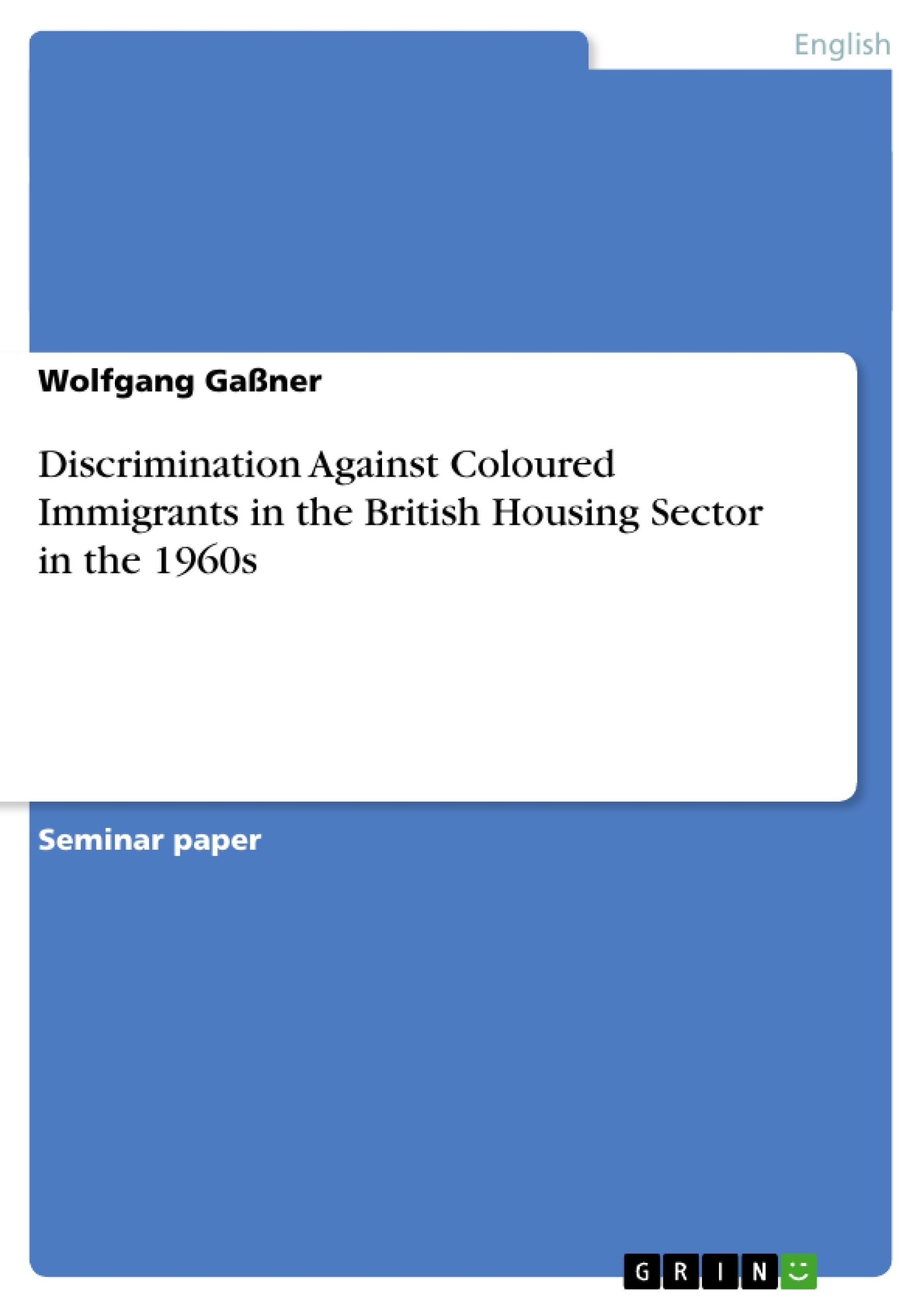The place you live in, where your accommodation is set, is a determinant factor for
the integration of coloured people in the society today and was one in the 1960s. It does
not only determine the education of the children and the employment of the
adolescent1, but the surrounding also has a deep impact on the social development.
Therefore it is easier for coloured immigrants to be integrated into British society, when
they are living in a rather middle-class area than in a run-down ‘immigration quarter’.
Wole Soyinka’s poem “Telephone Conversation” describes the attempt of a coloured
man to break out of the normally poor housing situation of blacks, but instead of getting
a fair chance to improve his living conditions, he is only discriminated against. This
paper will first have a close look on the poem and afterwards examine the reasons of
discrimination in the housing sector and how they worked in the daily search for a
better accommodation.
Inhaltsverzeichnis (Table of Contents)
- I Housing as an Important Factor of Integration
- II Analysis of Wole Soyinka's "Telephone Conversation"
- III Discrimination of Coloured Immigrants in the Housing Sector in Britain in the 1960s
- 1. General Situation in Britain in the 1960s
- 2. White Attitude Towards Coloured Neighbours
- IV Changes in Society were Necessary to Solve the Housing Problem
Zielsetzung und Themenschwerpunkte (Objectives and Key Themes)
This paper analyzes the difficulties faced by coloured immigrants in securing housing in 1960s Britain. It examines the context of this discrimination through an analysis of Wole Soyinka's poem "Telephone Conversation," followed by an exploration of the broader societal and economic factors contributing to the problem.
- The role of housing in the integration of coloured immigrants.
- Analysis of racial prejudice as depicted in Wole Soyinka's "Telephone Conversation."
- The impact of post-war economic growth and immigration on the British housing market.
- The prevalence of discrimination against coloured immigrants in the housing sector.
- The relationship between housing shortages and racial tensions.
Zusammenfassung der Kapitel (Chapter Summaries)
I Housing as an Important Factor of Integration: This chapter introduces the central theme of housing's significance in the integration of coloured immigrants, highlighting its impact on education, employment, and social development. It uses Soyinka's poem as a case study to illustrate the challenges faced.
II Analysis of Wole Soyinka's "Telephone Conversation": This section provides a detailed literary analysis of Soyinka's poem, focusing on its structure, language, and use of irony and sarcasm to expose racial prejudice in the context of housing acquisition.
III Discrimination of Coloured Immigrants in the Housing Sector in Britain in the 1960s: This chapter begins by outlining the post-war economic boom and subsequent immigration to Britain. It then discusses the resulting housing shortage and how this exacerbated existing tensions and discrimination against coloured immigrants in the search for accommodation. It further explores the attitudes of white Britons towards their coloured neighbours and the resulting social friction.
Schlüsselwörter (Keywords)
Coloured immigrants, British housing sector, 1960s, racial discrimination, integration, Wole Soyinka, "Telephone Conversation," post-war economic growth, housing shortage, racial tensions, prejudice.
Frequently Asked Questions
What was the housing situation for immigrants in 1960s Britain?
Coloured immigrants often faced severe discrimination, being forced into run-down 'immigration quarters' due to racial prejudice in the housing sector.
How does Wole Soyinka's poem 'Telephone Conversation' relate to this issue?
The poem describes a coloured man's attempt to rent accommodation and the blatant racial discrimination he encounters during a phone call with a white landlady.
Why is housing considered a key factor for integration?
Housing determines access to education and employment and has a deep impact on social development and the ability to integrate into middle-class society.
What role did the post-war economic boom play in housing tensions?
The economic growth led to increased immigration, which combined with a general housing shortage to exacerbate racial tensions and competition for accommodation.
What were the common attitudes of white Britons towards coloured neighbours?
Many white Britons held prejudiced views, fearing that coloured neighbours would lower the social status or property value of their areas.
What solution does the paper suggest for solving the housing problem?
The paper argues that fundamental changes in societal attitudes and fair housing policies were necessary to overcome systemic discrimination.
- Citar trabajo
- Wolfgang Gaßner (Autor), 2005, Discrimination Against Coloured Immigrants in the British Housing Sector in the 1960s, Múnich, GRIN Verlag, https://www.grin.com/document/119390



